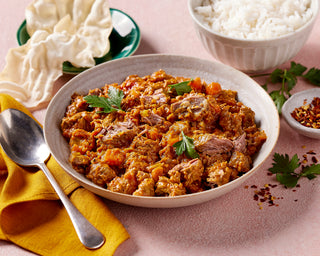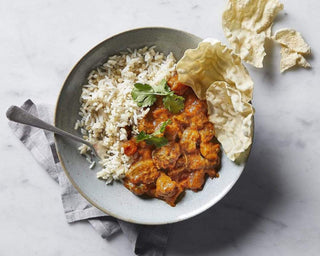
So you’re looking for the best dairy alternative to pour onto your cereal, or add into your protein shake? Well, you’ve come to the right place! Whether you’re lactose intolerant, or just looking to ditch the dairy, there are some things you need to know when consuming an alternative to cow's milk in terms of the environment, and your health.
Buyer beware though - while a glass of dairy milk produces nearly three times more greenhouse gas than any plant-based milk, alternatives have their own drawbacks (you may think twice about almond milk…more on this shortly).
Like all things here at Dineamic, it’s all about education and balance. Education to equip you with the knowledge to make the best choices, and balance to ensure you’re getting all the essential vitamins and nutrients you need from your diet. So before you pour your milk to listen to that sweet, sweet, ‘snap, crackle, pop’, let's see which is worthy of being crowned the best.
Before we get started…
Dairy foods including milk, cheese and yoghurt are rich in protein and many essential vitamins and minerals (calcium of course being the obvious one!). Including them as part of a balanced diet is important, so if you choose not to consume dairy, be sure you’re getting the essential nutrients your body needs from other sources, such as non-dairy milks that are fortified with vitamin B12 and calcium.
All plant-based milks are also not created equal. Nutritional quality will vary from brand to brand, so it’s important that you read labels.
Consuming a plant-based milk is not suitable for everyone, and may not be suited to you depending on your age, health condition or other factors. You may wish to consult a dietitian or nutritionist if you need further advice.
Which plant-based milk is the best?
Ok, we’re going to be real with you… the answer is not definitive. Why? Well, scientists and food sustainability experts are reluctant to single out one alternative and crown a winner.
Every plant-based milk alternative has a host of pros and cons. However, the one thing that’s clear is that milk alternatives are better for the planet than dairy. This study at the University of Oxford found the production of dairy uses nine times more land than alternatives, and produces almost three times more greenhouse gas.
So you can make the best choice for you, let's weigh up the pros and cons, and the costs of the most popular milk alternatives.
Coconut Milk
If you're nuts about coconut milk, you may want to rethink if you should be using this milk every day. Coconut milk is primarily harvested in countries like the Philippines, Indonesia and India. Because coconuts only grow in tropical regions (and demand is soaring worldwide), some workers are being exploited and rainforests negatively impacted.
If you do purchase coconut milk, you should try and buy Fair Trade (where fair prices are paid to the producers).
Coconut milk contains small amounts of naturally occurring calcium and phosphorus, which are very important for our teeth and bones. But the levels are not high enough for us to rely on this milk as our main source of these minerals. One litre of coconut milk will generally set you back about $2.80 to $3.50.
Check out what our nutritionists think about coconut here.
Almond Milk
Many Aussies fell in love with almond milk when it first became a popular choice for those ditching dairy. But almond milk is not all it was cracked up to be. The production of almond milk requires more water than any other plant-based alternative (130 pints for one glass of almond milk!).
Some almond milks contain good fats and vitamin E. They’re often a low kilojoule alternative to dairy milk - having roughly 160 kilojoules (40 calories) per 240ml. The milk, however, is low in protein, which is no surprise given how low kilojoule it is. A litre of almond milk generally costs about $2.00 - $4.00.
Rice Milk
Those who have been following a dairy-free diet for some time have probably tried rice milk at some stage. Although it’s quite widely available, it doesn't have much nutritional benefit. Rice milk also uses a lot of water in its manufacturing, and is in fact the plant-based milk which produces the most greenhouse gas emissions.
Rice milk is very low in fat and cholesterol. It is, however, very high in carbohydrates, making it a great source of energy! If you do want to drink rice milk make sure that it is enriched with calcium. Rice milk is usually cheaper than its plant-based counterparts, coming in at about $1.65 to $3.00 for a litre.
Soy Milk
Soy milk is the only plant-based milk that offers protein comparable to that of dairy milk. According to the Oxford University study, along with oat milk, it is the best choice when it comes to sustainability. You should try to buy organic soy milk, or research where the soybeans have been sourced as some soybean production is unsustainable.
Many people were turned off by soy milk when there were suggestions that its high concentration of phytoestrogens (plant hormones) could be an issue. However, there are many studies suggesting this not to be the case and that it’s a healthy choice in moderation. A litre of soy milk will usually set you back about $1.60 to $3.00.
Oat Milk
It’s the growing trend and becoming the choice of many Aussies for their cereals, coffees and more: the humble oat. Oat milk has surged in popularity, and lots of people are excited about it. Oat milk is grown in cooler climates, generally meaning there is less deforestation as a result. It is the best choice (along with soy) when it comes to sustainability.
Oat milk is a good source of energy giving carbs and contains some fibre, B vitamins, and minerals however you be best to choose oat milk that has been fortified with calcium to help meet your needs . Also check labels to ensure you’re avoiding oat milks with added sugar. Generally, 1 litre of oat milk will cost you about $2.80 to $4.50.




